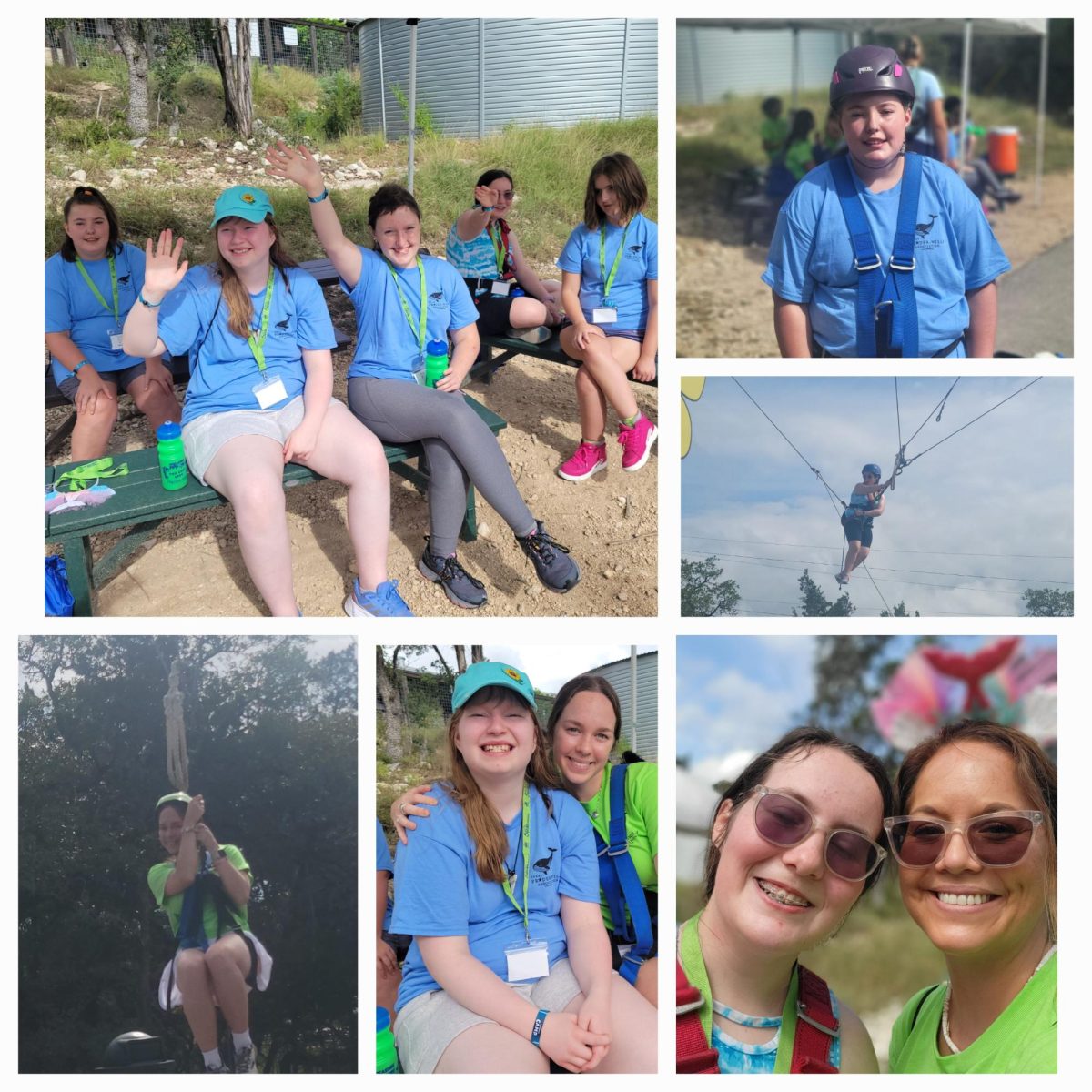African American Studies Aims To Make Education More Inclusive
Trustee Harrison talks to Ms. Buentello’s African American Studies class.
Racial equity in education. There has been debate for many years about how to represent ALL people in education. Of course, there’s also been a lot of opposition to this. Specifically against what people deem “Critical Race Theory”.
“Critical Race Theory teaches people to obsess over race and to believe that America is an evil, oppressive place,” Sen. Tom Cotton (R-Ark.) said. “Federal funds should not be used to support activists in schools who want to teach our kids to hate each other and their country.”
Critical Race Theory is an academic concept that analyzes the impacts of institutional racism. Critical Race Theory (CRT), is a concept mainly taught in college law classes. It is an advanced topic that the vast majority of elementary schoolers aren’t ready for. Which is why it isn’t being taught in elementary schools. The majority of opposition to “CRT” in elementary and middle schools, is typically directed towards more inclusive curriculums, and classes like African American Studies, a class available to students at Canyon Vista.
So what is African American Studies?
African American Studies is a high-school level class available to eighth graders, and is taught by Mrs. Angela Buentello. The class focuses on the history of lesser known African Americans and their contributions to American history. Most importantly, African American Studies is by no means a CRT class.
“Critical Race Theory is taught at the college level in mostly law school classes. African American History is American History, Asian American History is American history, Mexican American history is American history. The more we all know about the truth of our history, the better we can be moving forward for our entire country, and for the people in it. The better we can be to one another” RRISD Board of Trustees member Tiffanie Harrison said. “For a lot of black people in the US we’ve been robbed of our history, and so the fact that middle and high schoolers are learning, I think that’s something that’s really going to affirm their future journeys. I wonder what kind of person I would be, and what I would be able to achieve if I had more //knowledge about my history”
Despite Trustee Harrison’s strong affirmation that CRT isn’t being taught in any middle schools in RRISD, there are others who have run for board positions who feel differently.
“Teach ABCs and 123s, not CRTs and LGBTs”. For a large part of 2022, this slogan was found on lawn signs and billboards across RRISD. This was the slogan of Don Zimmerman. Zimmerman is a former Austin City Council Member, who champions a socially conservative political view. Zimmerman lost handily in the election, but he was also the face of a rising socially conservative movement in Round Rock.
“We have a board member, currently an incumbent, who is the champion, she is the queen of CRT. I think this stuff needs to be publicly confronted.” Zimmerman said to the Cardle and Woolley Podcast in June.
“What they are doing is deliberately imposing systemic racism, with the excuse of episodic racism. We have periods and episodes where somebody will be a racist, it’s episodic racism we deal with in America. So what the CRT quacks and hypocrites do, is they take episodes of racism and then falsely claim it’s systemic. Their solution is to impose systemic racism through the diversity, equity, and inclusion office. So if I get elected, I’m convinced we can abolish the systemic racism of the DEI office.”
The DEI (actually called EDI) office that Zimmerman refers to is the Round Rock Independent School District Office of Equity, Diversity, and Inclusion. According to the Round Rock Independent School District website, the office focuses on “delivering an equitable learning environment for every student enrolled in our schools and programs. Through the practice of equity we aim to improve student achievement and positively impact District operational outcomes and educator efficacy.” The website also talks about the DEI’s equity framework. The EDI says that they attempt to understand historic marginalization, and analyze data to make sure that each student has an equitable learning environment at school.
“I don’t think this office should be abolished at all. I would ask those people, ‘What are you exactly losing by having a district that is willing to support more diversity, inclusion, and a more equitable learning environment for students and staff?’. I don’t understand why making students and staff feel more included and having more buy-in to the district would make anyone think that DEI is systemically racist. I really feel these criticisms come from a place of lack of education, close mindedness, and/or privilege. No one is taking anything from anyone or making any one group feel “less than” by having DEI created in our district.” Mrs. Angela Buentello, eighth grade US History and African American Studies teacher said. “This office was not created to shame any one group, and if anything DEI was created to hear from more voices who are a part of the district, whether these critics like it or not. We lose as a society, a district, when we refuse to hear from all perspectives. Just because someone is shouting louder in objection to something that clearly is needed in the district, possibly for years, doesn’t mean that the person is right. For years, the few critics of diversity, equity, and inclusion have shouted out loud enough to drown out the voices of others, and now that they aren’t getting their way, they are choosing to be more of a problem than the solution. If they object to this office, then they need to bring a reasonable solution to the table of how we will make sure all students and staff are successful and have fair access to all types of education in this district.”
It’s not just teachers who believe this rhetoric is bad, students feel similarly too.
“If it wasn’t for African-American studies, I wouldn’t know a lot of things that really happened in United States History. It’s from minor things like Dolly Madison didn’t save Washington’s portrait to bigger events that involve African-Americans being completely ignored. Honestly when I heard of Don Zimmernman’s slogan I was horrified, I thought that couldn’t possibly be what he wants to do. Like nobody could possibly be that bad like in that sense.” an African-American studies student (8) said.
The support for African-American studies from teachers and students at Canyon Vista is overwhelming, however, there have been issues in other places.
“Our budget is tied to the Social Studies budget. … Any resources I was able to get were accidentally sent to another school, and were never returned. Thankfully I have a supportive department head, district staff, and principal that have tried to find me resources and trainings to attend for this class.” Mrs. Buentello said.
African-American studies offers a perspective that is seldom given in US-History classes, even those at the AP level. While there has been more of an effort to offer the perspectives of ALL Americans in US History, African-American studies offers a focus on the contributions of African-American studies in a way that no other US History class could provide.
“For years, students have been taught only one perspective of history, but we know that not everyone throughout history had the same experiences. When you talk about the American Revolution or the founding of our country, little to nothing is mentioned about the African Americans who were hoping to be included in the “Great Experiment” known as the United States of America. What was their perspective when they were excluded from the Declaration of Independence or when our founders protected the institution of slavery within the U.S. Constitution? I also like that students can learn that just because the Civil War had ended and the Civil Rights movement gained some wins, the struggle for equality for African Americans is still ongoing.” Mrs. Buentello said. “I will defend the value of this class and other Ethnic Studies classes as long as I can, as there is great value in hearing from all people who are a part of this country. My students this year are the model of how successful this class can be if structured appropriately with reasonable expectations.”
For more information about African American Studies as it is taught in the Round Rock Independent School District and Across the United States, you can visit these links below.
AP African American Studies information
For further reading about the Round Rock Independent School District’s EDI, go to the link below.


Hi. I love writing, and this is my second year writing for Canyon Echoes. I am Editor in Chief, and I'm really excited to work with Saanvi and Vedanti,...

Hey, I'm Vedanti, and I'm in 8th grade! I'm really excited to lead Canyon Echoes alongside Nikhil and Saanvi. In my free time, you can find me reading,...





















Vedanti • Feb 23, 2023 at 11:17 am
this is so well-written!